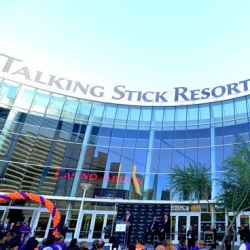
The Salt-River Pima Maricopa Indian Nation owns the Talking Stick Resort, the Scottsdale casino which gives its name to the TSR Arena, home to the Phoenix Suns.
Last month, the Arizona Senate introduced SB 1158, a bill which would legalize tribal sports betting in the state. Now it appears that three of the largest tribes oppose SB 1158. They argue the law should be changed by changing the gaming compact instead of passing a new sports betting bill.
The draft legislation would allow Arizona tribes to have on-reservation sportsbooks at casinos. The bill also would allow sports betting at kiosks which serve alcohol, including bars, restaurants that serve bear and wine, and private clubs which allow alcohol consumtpion with a license.
Senate Bill 1158 stipulates that no one but tribal operators could offer sports betting: “Each federally recognized Indian tribe that has a tribal-state gaming compact entered into pursuant to Chapter 6 of this title and that has tribal headquarters on Indian lands located in this state may operate sports betting as defined in Section 13-3301. No other person or entity may operate sports betting.”
The three tribes that oppose the bill are the Gila River Indian Community, the Fort McDowell Yavapai Nation, and the Salt River Pima-Maricopa Indian Community. The state senator who introduced the bill was angered at the tribes’ opposition.
Gila River, Salt River Pima, Yavapai Nation
State Sen. Sonny Borelli (R-District 5) said, “They think it should be negotiated in the compact, which is furthest from the truth. It has to be done legislatively…They’re trying to hijack this issue to strengthen their own position, which weakens the position of the smaller tribes.”
The long-time senator said, “I have a lot of small tribes in my district and I’m not going to be bullied by anybody.”
Senate Bill 1158: Tax Rate, Limitations
SB 1158 was introduced on a partisan basis, though lawmakers have some hope that the eventual votes will have a nonpartisan character. Sen. Sonny Borelli sponsored the bill in the Arizona Senate. State Rep. Mark Finchem (R-District 11) and Rep. Leo Biasiucci (R-District 5) introduced SB 1158 to the Arizona House of Representatives.
The bill sets a tax rate of 6.75% and limits the amount of sports betting which could take place on college sporting event. The bill states that legalization “does not include wagering on sporting events that is prohibited by the National Collegiate Athletic Association.”
Will SB 1158 Pass the Legislature?
Whether the legislation will gain widespread support is another matter. Local media described SB 1158 as a “workaround” until the state decides whether to legalize sports betting in general. Subsequent reports suggest that not all of Arizona’s tribes support the effort.
One reason for opposition is the bill could lead to sports betting expansion into commercial casinos. The Bloomberg BNA Report suggested that tribes would have to be bought off with other concessions if that were the case.
According to Bloomberg, the buyoff likely would be “a reduction in how much revenue tribes owe the state and lifted limitations on some gaming devices and table games.”
Estimates of Tax Revenue
One problem at the moment is the wildly different estimates that gaming analysts believe sports betting would bring to the Arizona Treasury Department. The Wells Research Gaming estimated that Arizona would collect between $486,000 and $2.3 million a year in sports betting taxes.
A 2017 Oxford study estimated a total more than 10x that amount. In the Oxford study, Arizona’s Treasury would collect $27 million a year in taxes from legalized sports betting. The Oxford report used 10% as its theoretical tax rate, so one could take 30% from its final total.
Even if one subtracts the 30% (about $8 million) from the total, though, Arizona would collect between $18 million and $19 million in the estimation of Oxford. If the two sides cannot come to an understanding of the statistics involved, it is hard to see how consensus might happen.
New Mexico Sports Betting
Arizona’s legislators want to legalize tribal sports betting soon. For decades, Nevada has had legal sports betting, but last year New Mexico also got in the mix. The Pueblo of Santa Ana Casino opened a sportsbook which allows most forms of pro and college sports betting, though it restricts betting on games involving the University of New Mexico and New Mexico State University.
The Pueblo of Santa Ana’s efforts appear to be a trial balloon for wider sports betting laws in New Mexico, at least if the New Mexico Department of Justice is correct. New Mexico Attorney General spokesman David Carl said at the time, “Sports betting at the Santa Ana Star Casino is governed by the Pueblo of Santa Ana Gaming Regulatory Commission.”
“As such, we will closely monitor New Mexico’s tribal gaming compacts and work with the legislature for proper statutory and regulatory oversight to require responsible gaming and enhanced integrity to create an even playing field for all.”
